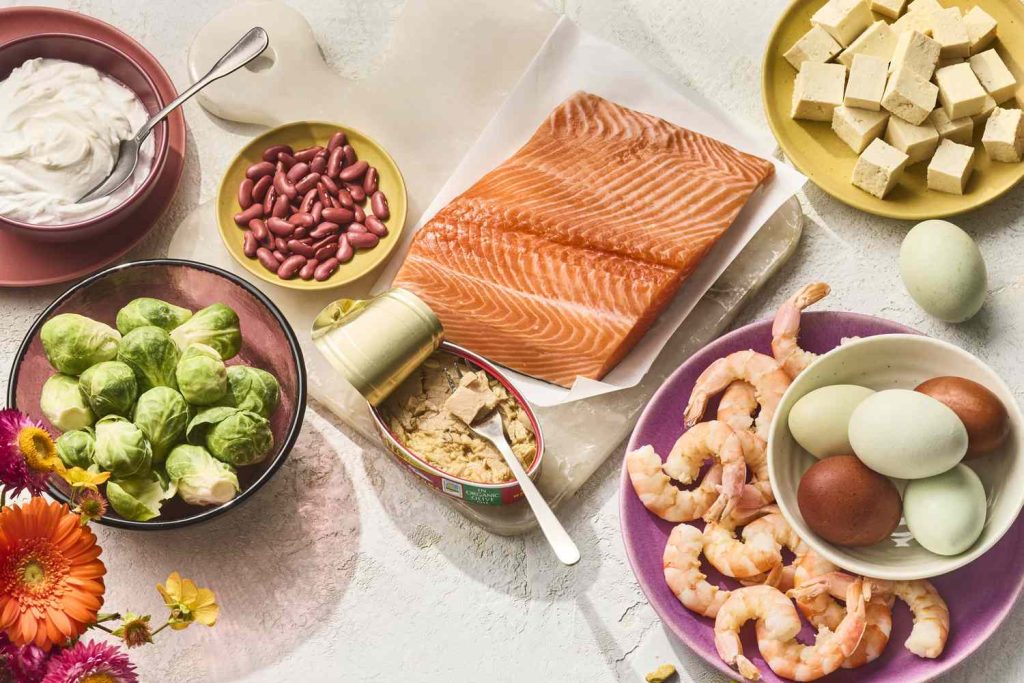:max_bytes(150000):strip_icc():format(jpeg)/0925_FEAProtein_opener-7f38582addbc4263abafbc5c60163947.jpg)
If you’re trying to eat more protein, whether to help build muscle mass or maintain a healthier brain, you’re not alone. And while there are many foods (hello cottage cheese!) that you’ve likely incorporated into your diet to reach your goals, there are also several mistakes that nutrition experts see time and again that might be sabotaging your efforts. I asked a few pros for guidance, and here’s what they said to avoid.
- Jenné Claiborne, recipe developer and author of Sweet Potato Soul Vegan Vibes
- Annie Fenn, MD, author of The Brain Health Kitchen and creator of the Brain Health Kitchen newsletter on Substack
- Katie Morford, MS RD, culinary dietitian and author of Rise & Shine: Better Breakfasts for Busy Mornings and Prep: The Essential College Cookbook
- Melissa Urban, co-creator of the Whole30 program and author of The New Whole30 Book
Winging It
If you’re just guessing, you’re probably not getting the whole picture. Instead, Katie Morford, RD, author of Rise & Shine: Better Breakfasts for Busy Mornings, suggests tracking your protein intake for a week or so, reading labels, and looking up nutrition info to see how everything stacks up. “You might uncover some surprises. For example, Greek yogurt can have more than double the protein of regular yogurt, and half a cup of cottage cheese can have a whopping 14 grams,” she says. Tracking will help you get a sense of the protein-ness of your go-to foods. Melissa Urban, co-creator of the Whole30 program, agrees that this is a good idea: “Knowing how much protein is in a serving of beans, tofu, or fish can help you better plan your meals—like adding chicken sausage to your morning eggs.”
If you have a history of disordered eating or any other chronic health issue, talk to a physician or registered dietitian before tracking your protein intake or changing your diet.
Skipping Strength Training
This is important! Boosting your protein intake won’t build much muscle mass if you aren’t also doing strength training. Not just walking, not just riding your bike, but actual strength training, like using elastic bands or doing planks or lifting weights, Annie Fenn, MD, author of The Brain Health Kitchen cookbook, says. “You need both the stimulus on the muscles and the protein floating around in the body for protein muscle synthesis—building muscle—to happen.” The American Heart Association recommends getting strength training into your exercise routine at least twice a week. Fenn suggests working your way up to three or four sessions a week (about 30 minutes each).
Forgetting Other Nutrients
Focus too much on protein and you risk crowding out other nutrients in your diet, Morford warns. “Eating protein-rich foods is important, but so is getting lots of colorful fruits and vegetables, healthy fats, and fiber-rich whole grains, beans, and legumes.” Plus, getting all your protein from meat can have health and environmental consequences. Which brings us to more on plants…
Not Piling on the Plants
There’s a misconception that it’s difficult to get enough protein in a plant-forward diet, says Jenné Claiborne, author of the cookbook Sweet Potato Soul Vegan Vibes. “Foods like legumes, whole grains, veggies, nuts, and seeds are naturally rich in protein.” Claiborne eats at least 80 grams a day, despite putting zero animal products on her plate. “This looks like oatmeal for breakfast, and beans or lentils with whole grains and vegetables for lunch and dinner,” she says, along with strategic snacks. Speaking of snacks, try to keep fruits and veggies in the mix. Morford follows a “produce plus protein” model for eating between meals. “Combine things like apples and almond butter, carrot sticks and hummus, and cottage cheese and berries, or mash a hard-boiled egg with avocado.”
Discounting Soy
The idea that soy increases breast cancer risk or disrupts thyroid function has been debunked, Fenn says. “The data on soy being harmful is outdated. We should embrace it without fear.” Minimally processed soy (tofu, edamame, tempeh), as opposed to ultraprocessed protein bars and meat substitutes, is a fantastic source of protein, she says.

